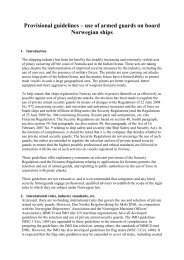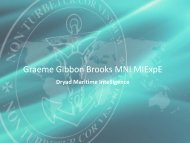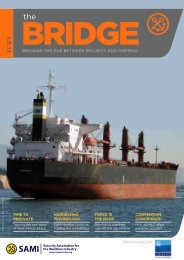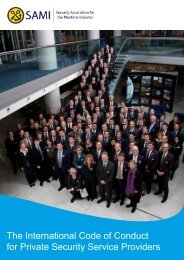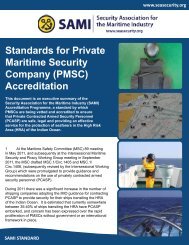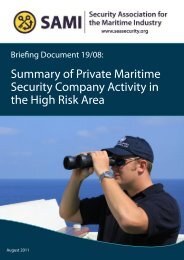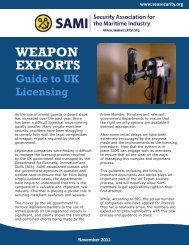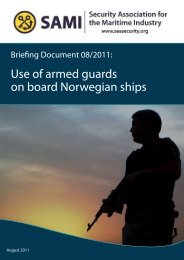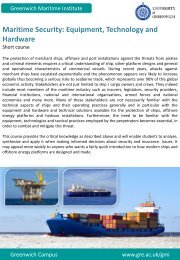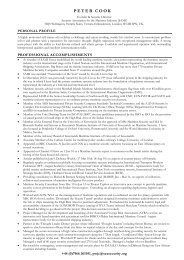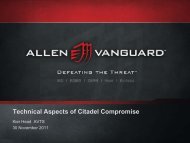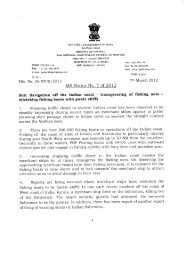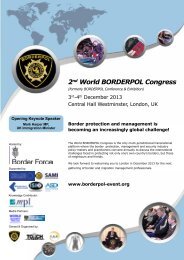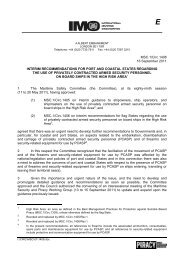C5.1.d.d. In the case of a marine casualty, must an official inquiry be held?Regulation 5.1.6, paragraph 1 of the MLC, 2006 provides that each Member musthold an official inquiry into any serious marine casualty, leading to injury or loss of life,that involves a ship that flies its flag.C5.2. Port State responsibilitiesC5.2.a. What is a port State?This is the term used to describe the authority under international law for a country toexercise regulatory control with respect to foreign ships that come into its port. Mainly thistakes the form of inspecting (often called “port State control”) the ship <strong>and</strong> conditions onboard the ship. It can be regarded as a form of international cooperation under Article I,paragraph 2 of the MLC, 2006 whereby the port State role supports the efforts of flagStates by inspecting ships to ensure that they remain compliant between inspections by theflag State. This important role is also referred to in Article V, paragraphs 4 <strong>and</strong> 7 of theMLC, 2006. A country can be <strong>and</strong> often is, simultaneously a flag State, for purposes ofregulating the ships that fly its flag, <strong>and</strong> a port State with respect to ships of othercountries.C5.2.b. What is the purpose of a port State inspection?The purpose of the inspection by an authorized officer (a PSCO) of a foreign shipcoming into port is to check whether it is in compliance with the requirements of the<strong>Convention</strong> (including seafarers’ rights).C5.2.c. What is port State control?The term “port State control” arises from arrangements among countries in a region towork together <strong>and</strong> cooperate with respect to carrying out port State control (inspections) toensure that ships coming into their ports meet international st<strong>and</strong>ards. As noted on thewebsite of the first of these regional arrangements:… the Paris MOU, is an administrative agreement between the maritime authorities of twentyfourEuropean countries <strong>and</strong> Canada. In 1978 the ‘Hague Memor<strong>and</strong>um’ between a number ofmaritime authorities in Western Europe was developed. It dealt mainly with enforcement ofshipboard living <strong>and</strong> working conditions, as required by ILO <strong>Convention</strong> No. 147. However,just as the Memor<strong>and</strong>um was about to come into effect, in <strong>March</strong> 1978, a massive oil spilloccurred off the coast of Brittany (France), as a result of the grounding of the supertanker‘Amoco Cadiz’. This incident caused a strong political <strong>and</strong> public outcry in Europe for farmore stringent regulations with regard to the safety of shipping. This pressure resulted in amore comprehensive memor<strong>and</strong>um which covered:• safety of life at sea,• prevention of pollution by ships,• living <strong>and</strong> working conditions on board ships.Subsequently, a new, effective instrument known as the Paris Memor<strong>and</strong>um ofUnderst<strong>and</strong>ing on Port State Control was adopted in January 1982 <strong>and</strong> was, initially, signed byfourteen European countries. It entered into operation on 1 July 1982. Since then, the ParisMOU has exp<strong>and</strong>ed to 27 maritime Administrations.” As noted by the IMO “these inspectionswere originally intended to be a back up to flag State implementation, but experience hasshown that they can be extremely effective, especially if organized on a regional basis. A shipgoing to a port in one country will normally visit other countries in the region beforeembarking on its return voyage <strong>and</strong> it is to everybody's advantage if inspections can be closelyco-ordinated. This ensures that as many ships as possible are inspected but at the same timeFAQ 47
prevents ships being delayed by unnecessary inspections. The primary responsibility for ships'st<strong>and</strong>ards rests with the flag State - but port State control provides a “safety net” to catchsubst<strong>and</strong>ard ships. IMO has encouraged the establishment of regional port State controlorganizations <strong>and</strong> agreements on port State control – Memor<strong>and</strong>a of Underst<strong>and</strong>ing or MOUs– have been signed covering all of the world's oceans: Europe <strong>and</strong> the north Atlantic (ParisMOU); Asia <strong>and</strong> the Pacific (Tokyo MOU); Latin America (Acuerdo de Viña del Mar);Caribbean (Caribbean MOU); West <strong>and</strong> Central Africa (Abuja MOU); the Black Sea region(Black Sea MOU); the Mediterranean (Mediterranean MOU); the Indian Ocean (Indian OceanMOU); <strong>and</strong> the Arab States of the Gulf (GCC MoU (Riyadh MoU)).C5.2.d. Is a port State required to inspect all foreign ships?Regulation 5.2.1, paragraph 1 provides that every foreign ship calling, in the normalcourse of its business or for operational reasons, in the port of an ILO Member may be thesubject of inspection in accordance with paragraph 4 of Article V of the MLC, 2006 for thepurpose of reviewing compliance with the requirements of the <strong>Convention</strong> (includingseafarers’ rights) relating to the working <strong>and</strong> living conditions of seafarers on the ship.As indicated by the word “may”, the inspection of foreign ships is permissive ratherthan m<strong>and</strong>atory under the MLC, 2006.C5.d.e. Who is an “authorized officer” for port State control?The MLC, 2006 does not define the term authorized officers; so this would be amatter for national implementation.The tripartite experts’ meeting in September 2008 adopted the Guidelines for portState control officers carrying out inspections under the <strong>Maritime</strong> <strong>Labour</strong><strong>Convention</strong>, 2006 35 to assist port State control officers to carry out inspections of foreignships coming into their ports [see A14. What is the status of the 2008 ILO Guidelines, forflag State inspections <strong>and</strong> port State control officers?]. They provide the followingtripartite guidance:2.2. Port State control officers30. Port State control inspection under the MLC, 2006, is to be carried out by “authorized”officers (Regulation 5.2.1, paragraph 3). As mentioned earlier, the term “port Statecontrol officer (PSCO)” is adopted in these guidelines. This means that persons must beauthorized, by the competent authority in the port State to carry out these inspections <strong>and</strong>should carry official identification that can be shown to ships’ masters <strong>and</strong> to seafarers.31. PSCOs should also be given sufficient power under relevant national laws or regulationsto carry out their responsibilities under the MLC, 2006, in the event that a port Stateauthority decides to inspect a foreign ship.32. The MLC, 2006, does not set out specific requirements with respect to PSCOs, but portState control is to be carried out in accordance with the MLC, 2006, <strong>and</strong> “… otherapplicable international arrangements governing port State control inspections”(Regulation 5.2.1, paragraph 3). This means that existing requirements <strong>and</strong> internationalguidance with respect to qualifications <strong>and</strong> training required for persons functioning as aPSCO would be generally relevant. 3635 See footnote 5.36 See: IMO resolution A.787(19), section 2.5; Annex 7 of the Paris MOU, <strong>and</strong> the Code of goodpractice for port State control officers, adopted in the framework of the IMO(MSC-MEPC.4/Circ.2). The provisions of the MLC, 2006, relating to flag State inspectors may also48 FAQ
- Page 8: C5.1. Flag State responsibilities .
- Page 11 and 12: the Convention regarding the need f
- Page 13 and 14: oard ships but are not directly inv
- Page 15 and 16: supervisory system (a system establ
- Page 18 and 19: A16. How does the MLC, 2006 make it
- Page 20 and 21: A19. What will happen to the mariti
- Page 22 and 23: B. Questions about the workers andt
- Page 27 and 28: authority?] as qualified to issue s
- Page 29 and 30: C1.3.b. Does this training requirem
- Page 31 and 32: It may be useful to also consider t
- Page 33 and 34: equirements for upgrading or promot
- Page 35 and 36: C2.3.h. Do the hour of rest and hou
- Page 37 and 38: C3. Title 3 Accommodation, recreati
- Page 39 and 40: y berths and lockers, chests of dra
- Page 41 and 42: C4.1.b. Must every ship have a ship
- Page 43 and 44: • the cost of safeguarding the pr
- Page 45 and 46: (b) facilities for sports and outdo
- Page 47 and 48: • Sickness benefit• Unemploymen
- Page 49 and 50: agreed upon international standards
- Page 51 and 52: provisions of Regulation 5.1.3 and
- Page 53 and 54: C5.1.o. What is the period of valid
- Page 55: (b)(c)to carry out any examination,
- Page 59 and 60: certificate and DMLC should be the
- Page 61 and 62: C5.2.q. Are complaints confidential
- Page 64 and 65: INTERNATIONAL LABOUR CONFERENCECont
- Page 66 and 67: Maritime Labour Convention, 2006MAR
- Page 68 and 69: Maritime Labour Convention, 2006(b)
- Page 70 and 71: Maritime Labour Convention, 20062.
- Page 72 and 73: Maritime Labour Convention, 2006Pla
- Page 74: Maritime Labour Convention, 20062.
- Page 78: Explanatory note to the Regulations
- Page 82 and 83: Minimum requirements for seafarers
- Page 84 and 85: Minimum requirements for seafarers
- Page 86 and 87: Minimum requirements for seafarers
- Page 88 and 89: Minimum requirements for seafarers
- Page 90 and 91: Conditions of employmentTITLE 2. CO
- Page 92 and 93: Conditions of employmentGuideline B
- Page 94 and 95: Conditions of employment3. National
- Page 96 and 97: Conditions of employment(a) hours o
- Page 98 and 99: Conditions of employment4. Paragrap
- Page 100 and 101: Conditions of employmentRegulation
- Page 102 and 103: Conditions of employment(b) accommo
- Page 104 and 105: Conditions of employmentciently and
- Page 106 and 107:
Accommodation, recreational facilit
- Page 108 and 109:
Accommodation, recreational facilit
- Page 110 and 111:
Accommodation, recreational facilit
- Page 112 and 113:
Accommodation, recreational facilit
- Page 114 and 115:
Accommodation, recreational facilit
- Page 116 and 117:
Accommodation, recreational facilit
- Page 118 and 119:
Accommodation, recreational facilit
- Page 120 and 121:
Health protection, medical care, we
- Page 122 and 123:
Health protection, medical care, we
- Page 124 and 125:
Health protection, medical care, we
- Page 126 and 127:
Health protection, medical care, we
- Page 128 and 129:
Health protection, medical care, we
- Page 130 and 131:
Health protection, medical care, we
- Page 132 and 133:
Health protection, medical care, we
- Page 134 and 135:
Health protection, medical care, we
- Page 136 and 137:
Health protection, medical care, we
- Page 138 and 139:
TITLE 5. COMPLIANCE AND ENFORCEMENT
- Page 140 and 141:
Compliance and enforcement(a) has t
- Page 142 and 143:
Compliance and enforcement7. Detail
- Page 144 and 145:
Compliance and enforcement14. A cer
- Page 146 and 147:
Compliance and enforcement5. If a M
- Page 148 and 149:
Compliance and enforcement(a) the i
- Page 150 and 151:
Compliance and enforcementGuideline
- Page 152 and 153:
Compliance and enforcement(c)(d)the
- Page 154 and 155:
Compliance and enforcementStandard
- Page 156 and 157:
APPENDIX A5-IThe working and living
- Page 158 and 159:
Appendix A5-IIThis is to certify:1.
- Page 160 and 161:
Appendix A5-IIMaritime Labour Conve
- Page 162 and 163:
Appendix A5-IISignature: ..........
- Page 166 and 167:
Appendix A5-IIThis Certificate is v
- Page 168 and 169:
APPENDIX B5-I - EXAMPLE OF A NATION
- Page 170:
Appendix B5-IDeclaration of Maritim



